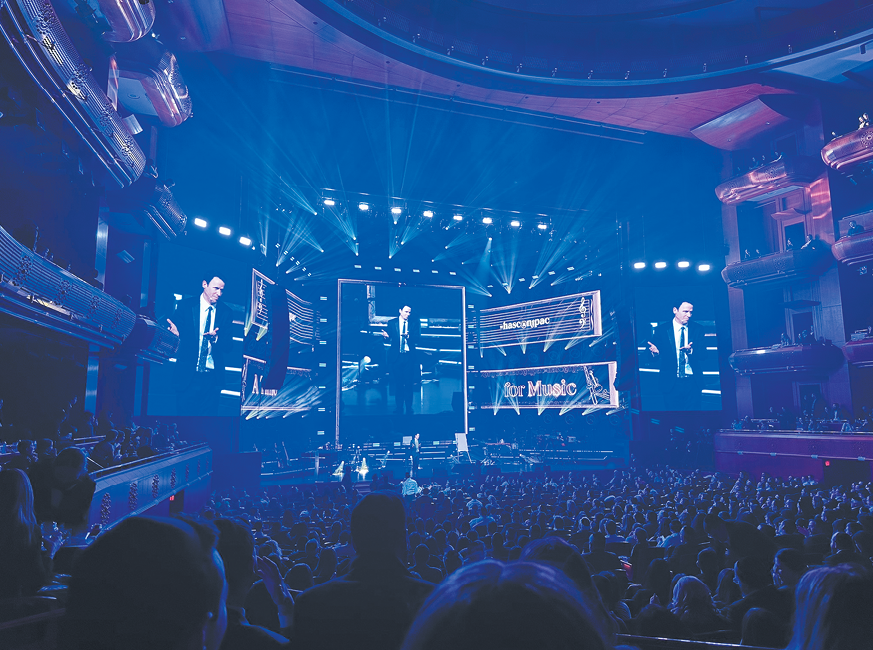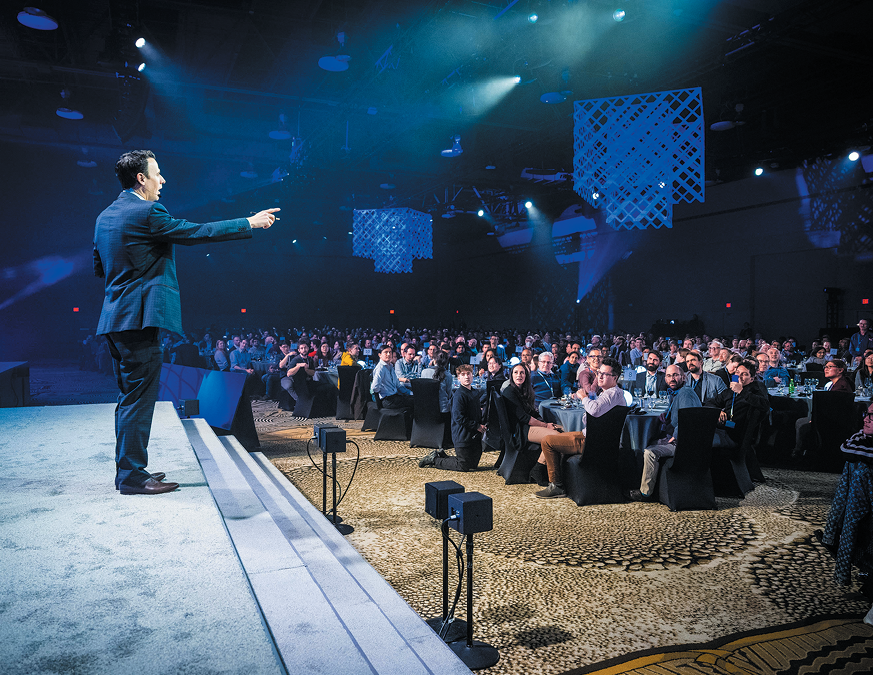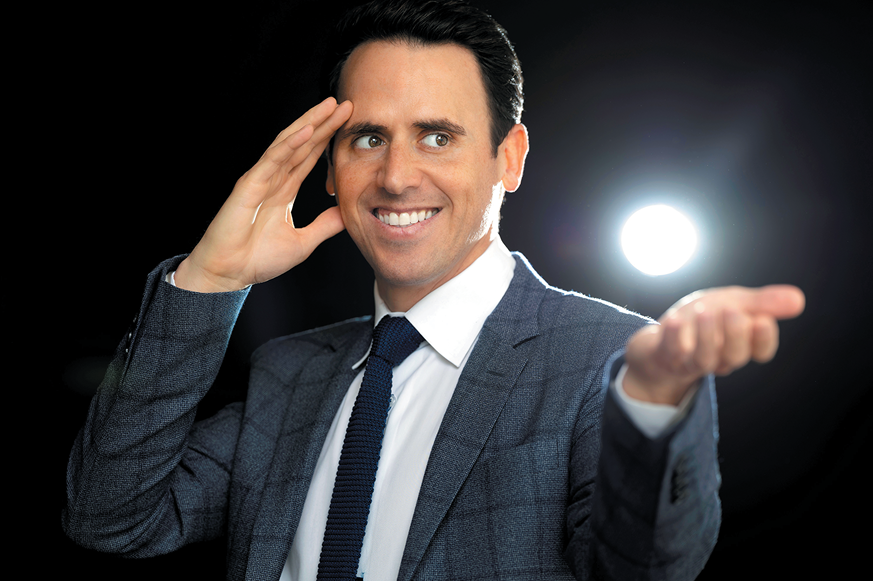- Home
- Media Kit
- MediaJet
- Current Issue
- Past Issues
- Ad Specs-Submission
- Reprints (PDF)
- Photo Specifications (PDF)
- Contact Us
- PRIVACY POLICY
- TERMS OF USE
![]()
ONLINE
![]()
ONLINE

Oz The Mentalist
Editors’ Note
Oz Pearlman (ozpearlman.com) is the most televised, followed on social media, and sought after mentalist in the world today. He developed an interest in magic at a young age and what started as a hobby quickly became a lifelong passion. After a couple of years spent working on Wall Street, Pearlman decided to pursue his dream and become a full-time entertainer. His client list reads like a who’s who of politicians, professional athletes, A-list celebrities, and Fortune 500 companies. In the summer of 2015, Pearlman was featured on America’s Got Talent. He has hundreds of other TV appearances on both national and international networks, a few of which include NBC’s Late Night with Jimmy Fallon, The TODAY Show, and ABC World News and has been profiled on the cover of The New York Times, Forbes, and GQ to name but a few. Pearlman is also an avid marathon and ultra-marathon runner, having completed such grueling races as the Badwater 135 Miler, Hawaii Ironman World Championships, Western States 100 and Spartathlon.

Oz Pearlman performances (above and below)
Did you always know you had a passion for being a mentalist?
I have done this since I was a teenager. When I was 13, my parents got divorced and it was a difficult time. We went on a cruise, and I saw a magician for the very first time. He brought me on stage and I was blown away. While many kids that age have a passing interest in magic, it became an all-consuming obsession for me. I spent any money I had buying books, researching and studying the art of magic, and when I ran out of money my mother told me I needed to get a job. I printed business cards and hand cut them myself, and my first regular gig was at an Italian family style restaurant a half a mile from my house where I worked at the age of 14 every Tuesday night going table to table performing close up magic.
I come from a very entrepreneurial background, and I really needed to do this on the side to subsist. After graduating high school at the age of 16, my parents moved back to Israel and I was forced to support myself. I went to college and from that point forward paid every bill I had myself. I either had scholarships or a couple of businesses I ran. I did magic on the side from age 16 to 20 when I was at the University of Michigan. I was always out there driving business, meeting event planners, working at restaurants. The latter was really helpful in learning how to interact with people in a setting where they didn’t necessarily want you; it’s the best sales training you can get. Imagine you’re interrupting somebody at dinner with their family or their friends – you learn human dynamics very quickly and you learn how to iterate. You learn the psychology of it. Now I can be in a room with a movie star or with a CEO of a Fortune 100 company, and I know how to relate to that person in the span of 10 or 15 seconds because that’s how quickly people decide what they think about you.
How is being a mentalist different from being a magician?
There is a big difference, although they intersect in a certain way. Most mentalists started as magicians because they have the same foundation. A great analogy I like to say especially being Jewish and telling my Jewish mother I’m quitting Wall Street to become a mentalist is that it’s kind of like being a doctor in the sense of everyone does premed, but then somebody who goes and becomes a general physician is like being a magician. Somebody who becomes a plastic surgeon, or specializes in anything of that sort, is a specialist, so this is like being a mentalist. There are very few mentalists in the world, and there are even fewer ones that are good at it and not boring because it’s an inherently boring thing to just keep guessing what people are thinking. You have to find a way to make it relatable, entertaining, unique, and visual. That’s really the most difficult challenge. It’s not doing the performance. It’s knowing how to make it appeal to an audience on an emotional level. I can do magic, but that doesn’t distinguish me from everyone else. What separates me is the mentalism, which is the ability to influence and read people, and it takes years of study and commitment to perfect this craft.

How critical is it to continue to innovate to be successful?
One of the big ways to differentiate yourself is through innovation. An example would be Taylor Swift. There are many reasons why Taylor Swift is successful, but aside from all her other talents she is an incredible singer-songwriter, a true double threat. The songs are so powerful because she wrote them herself. This is such a rare combination which brings a level of authenticity that connects with her fans. You are getting a piece of her and her life story through her music.
Within my world, there are only a handful of the “singer-songwriters” where you are the creator and the performer. I am constantly innovating and doing new things, and then I package them very differently. My secret sauce is that I am taking a mirror, and I am shining it on you. The star of my show is always the audience. An example is when I go on CNBC, which I have done over two dozen times. There has never been another mentalist to perform on CNBC. Why would a serious business network have me on their show? It is because when I get on there, I speak to their viewers. I theme my presentations around interest rates, equities, the markets. When I am on, someone in private equity is thinking, “how does this guy know everything about what I do?” I create content based on the end viewer.
Are there times when things go wrong?
For sure. I think that if stuff never went wrong, it wouldn’t be as impressive because it’s kind of like a danger act. If you ever watched Evil Knievel, you watched to see the jump clear, but you’re also waiting to see if maybe something will happen and knowing that he crashed in the past and broke every bone in his body is what kind of has a little bit of an allure.
While things may go wrong, I plan for that to potentially happen so the audience will rarely notice it.

Are there natural gifts that a person needs to possess to become a mentalist?
While I do not think that just anyone can do this, I do think that anyone can try to do this. It takes persistence and resilience and making the right decisions when you reach a fork in the road. I am writing a book that touches on this – not about the mentalism, but about how you become the best in your field because I have had the opportunity through my work to interact with and get to know many successful people in politics, business, sports and entertainment, etc. I am fascinated at studying what people did to become successful. When it comes to my specific trade, it is about consistency and focusing on the audience more than on myself.
Do you miss the early days when it was all about the work and you were just starting to build your career?
You always miss the “come up.” I’ve read numerous biographies of famous figures within the entertainment industry, and they said the happiest they ever were was when their band was playing in total dives, making no money and that journey, which is very cliché but it’s true. I do miss the early days when I was scrapping. I had an off-Broadway show that I had put together with me and one other guy. I got teenagers to be my ushers. We put this whole thing together and boot-strapped it. One night, Ethan Hawke came to my show and The New York Times came a week later to review it, and we didn’t have publicists. We didn’t have anything. We were doing this show in the back of a yoga studio. The excitement and the novelty of everything when you do that is so different than when you become more known and successful.
Are you able to take moments to reflect on your career and celebrate the success?
I try to, but like many entrepreneurs, I am always looking ahead and thinking about what is next. Every time I do a show, I think about what I can do to make it even bigger. I am focused on elevating the craft, since right now most people do not know what a mentalist is. It is my hope that in the coming years, not only is it known, but that I can define the category and when you ask people the question, “what is a mentalist?” their automatic response will be, “you mean like Oz the Mentalist?”![]()